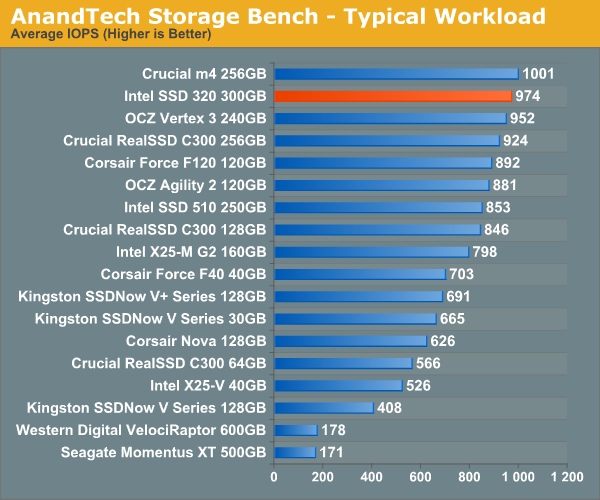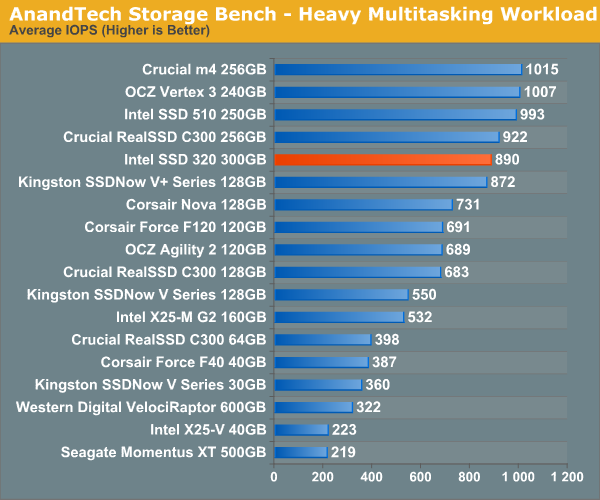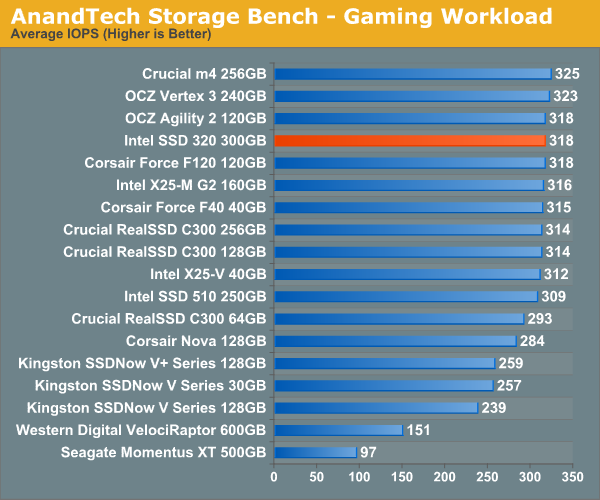The Intel SSD 320 Review: 25nm G3 is Finally Here
by Anand Lal Shimpi on March 28, 2011 11:08 AM EST- Posted in
- IT Computing
- Storage
- SSDs
- Intel
- Intel SSD 320
AnandTech Storage Bench 2010
To keep things consistent we've also included our older Storage Bench. Note that the old storage test system doesn't have a SATA 6Gbps controller, so we only have one result for the 6Gbps drives.
The first in our benchmark suite is a light/typical usage case. The Windows 7 system is loaded with Firefox, Office 2007 and Adobe Reader among other applications. With Firefox we browse web pages like Facebook, AnandTech, Digg and other sites. Outlook is also running and we use it to check emails, create and send a message with a PDF attachment. Adobe Reader is used to view some PDFs. Excel 2007 is used to create a spreadsheet, graphs and save the document. The same goes for Word 2007. We open and step through a presentation in PowerPoint 2007 received as an email attachment before saving it to the desktop. Finally we watch a bit of a Firefly episode in Windows Media Player 11.
There’s some level of multitasking going on here but it’s not unreasonable by any means. Generally the application tasks proceed linearly, with the exception of things like web browsing which may happen in between one of the other tasks.
The recording is played back on all of our drives here today. Remember that we’re isolating disk performance, all we’re doing is playing back every single disk access that happened in that ~5 minute period of usage. The light workload is composed of 37,501 reads and 20,268 writes. Over 30% of the IOs are 4KB, 11% are 16KB, 22% are 32KB and approximately 13% are 64KB in size. Less than 30% of the operations are absolutely sequential in nature. Average queue depth is 6.09 IOs.
The performance results are reported in average I/O Operations per Second (IOPS):

If we strip 6Gbps out of the equation completely, the SSD 320 does very well in our old light workload. You're looking at performance that's at the top of the pack from the mainstream offering.
If there’s a light usage case there’s bound to be a heavy one. In this test we have Microsoft Security Essentials running in the background with real time virus scanning enabled. We also perform a quick scan in the middle of the test. Firefox, Outlook, Excel, Word and Powerpoint are all used the same as they were in the light test. We add Photoshop CS4 to the mix, opening a bunch of 12MP images, editing them, then saving them as highly compressed JPGs for web publishing. Windows 7’s picture viewer is used to view a bunch of pictures on the hard drive. We use 7-zip to create and extract .7z archives. Downloading is also prominently featured in our heavy test; we download large files from the Internet during portions of the benchmark, as well as use uTorrent to grab a couple of torrents. Some of the applications in use are installed during the benchmark, Windows updates are also installed. Towards the end of the test we launch World of Warcraft, play for a few minutes, then delete the folder. This test also takes into account all of the disk accesses that happen while the OS is booting.
The benchmark is 22 minutes long and it consists of 128,895 read operations and 72,411 write operations. Roughly 44% of all IOs were sequential. Approximately 30% of all accesses were 4KB in size, 12% were 16KB in size, 14% were 32KB and 20% were 64KB. Average queue depth was 3.59.

Crank up the workload and the 320 falls a bit behind the rest of the competitors. Last year's heavy multitasking workload is nothing compared to what we introduced earlier this year, so it's still pretty light by comparison but it's clear for normal usage the 320's 3Gbps performance is quite good.
The gaming workload is made up of 75,206 read operations and only 4,592 write operations. Only 20% of the accesses are 4KB in size, nearly 40% are 64KB and 20% are 32KB. A whopping 69% of the IOs are sequential, meaning this is predominantly a sequential read benchmark. The average queue depth is 7.76 IOs.











194 Comments
View All Comments
NandFlashGuy - Monday, March 28, 2011 - link
Actual data shows that Intel's G2 SSD Reliability is already ahead of mechanical drives:Here's a paper at the 1997 FAST conference discussing actual hard drive failure rates:
http://www.cs.toronto.edu/~bianca/papers/fast07.pd...
A link to the French e-tailer return rate data showing Intel SSDs better than mechanical drives:
http://www.hardware.fr/articles/810-6/taux-pannes-...
A good talk discussing SSD failure rates and mechanisms:
http://intelstudios.edgesuite.net/idf/2010/sf/aep/...
Have any real data to support your claim?
NandFlashGuy - Monday, March 28, 2011 - link
Correcxtion. The FAST paper was from 2007.nonzenze - Monday, March 28, 2011 - link
We were promised Vertex 3 end of March. Didn't happen. At least the Intel 510s are on Newegg ... This review has no mention at all of availability, which I take to be a terrible sign that we won't actually see these in time.Meanwhile it's utterly impossible to plan a build for a new machine with a next-gen SSD because I have no idea when I'll actually be able to order and receive one!
Soft launches suck!
turbodreams - Monday, March 28, 2011 - link
You write "The AS-SSD sequential benchmark takes place at a very high queue depth of 32". This is not correct, as it takes place at QD 1. I asked the author of the benchmark about this, *only* the 4K-64 test uses a higher QD of 64.Anand Lal Shimpi - Monday, March 28, 2011 - link
That's very odd. Perfmon reports a queue depth of 1 however one of our internal monitoring tools indicates a queue depth of 32. I will remove the reference but I'm curious to see what's going on here.Take care,
Anand
WintersEdge - Monday, March 28, 2011 - link
I'm confused. The benchmarks show results for the Crucial M4. Where is the full review for that drive? Did I miss something? Thanks.Shadowmaster625 - Monday, March 28, 2011 - link
$160 for a 74GB SSD? And it is just as slow as the last generation? They are absolutely out of their freakin minds. They're gouging the hell out of their trusting victims. I wont even comment on how awful the 40GB version is, for $90. LOL I just bought an Agility 2 for $90.Chloiber - Tuesday, March 29, 2011 - link
And how happy are you with 35MB/s seq. Write and less than 200 seq. Read?erple2 - Monday, March 28, 2011 - link
What? So you did a hack that Apple doesn't fully support, and expect that if it implodes, you get to complain about it?Really?
I'm disappointed in you, Brian.
overzealot - Tuesday, March 29, 2011 - link
It was a joke. Lighten up.